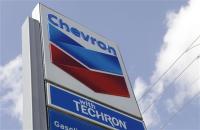Chevron sticks with oil. And it pays off.
By CHRIS KAHN AP Energy Writer
Posted: 04/27/2012 05:54:14 AM PDT
Updated: 04/27/2012 03:07:24 PM PDT
Click photo to enlarge

FILE - This July 25, 2011, file photo, shows a Chevron sign at a... ((AP Photo/Lynne Sladky, File))
NEW YORK—Chevron never bought into North America's natural gas boom the way Big Oil peers like Exxon did.
That decision appears to be paying off.
The San Ramon, Calif. energy giant reported Friday that profits increased 4.2 percent from January to March as oil sold for higher prices. Meanwhile a plunge in U.S. natural gas prices contributed to an 11 percent profit decline at Exxon. ConocoPhillips, another major U.S. natural gas producer, saw profits fall 3 percent.
Chevron's reliance on oil "turned out to be a really good decision," Argus Research analyst Phil Weiss said. "And it could serve them well. They have a lot of cash on hand."
New technologies set off a rush to explore the continent's vast shale gas deposits that eventually drew in the major oil companies. Exxon Mobil Corp. made a big splash in 2010 with a $35 billion acquisition of XTO Energy that made it America's largest natural gas producer overnight. Exxon now produces more natural gas than oil.
Royal Dutch Shell spent about $11 billion to acquire large tracts of natural gas-producing assets in North America.
Chevron's only major move in North American natural gas was a $4.3 billion deal last year to acquire Atlas Energy of the U.S. Oil still makes up more than two-thirds of Chevron's total production.
Chevron, the second-largest U.S. energy company behind Exxon, reported net income of $6.47 billion, or $3.27 per share, for the first quarter. That compares with $6.21 billion, or $3.09 per share, for the same part of 2011. Revenue increased less than 1 percent to $60.7 billion.
The results met Wall Street expectations.
From January to March, Chevron sold crude and other liquid hydrocarbons for an average of $102 per barrel in the U.S. and $110 per barrel internationally, up 15 and 16 percent, respectively. That boosted revenue even as overall production dropped 4.7 percent.
The major oil companies, including Chevron, are struggling with a slowdown in production. New fields are tougher to find and expensive to develop. And many of the best reserves are owned by foreign governments that reduce the amount of oil that companies can sell as prices rise.
Chevron also suffered a reduction to production in Brazil. The Brazilian government ordered Chevron to shut down operations at its offshore Frade field after an oil leak at one of its wells. Prosecutors are now seeking $11 billion in environmental damages and have filed criminal charges against executives from Chevron and rig owner Transocean Ltd.
Pat Yarrington, Chevron's chief financial officer, said in a conference call that production in the area will stay offline while the company conducts a "technical study" of the field's underlying geology.
"We will resume production in the Frade field only when we are completely satisfied we can restart production safely, and when we have obtained the full support of our partners in the Brazilian regulators," Yarrington said.
Profits at Chevron's refining business rose 29 percent, but mostly because it sold its Pembroke Refinery in the United Kingdom and other assets for $200 million.
Other oil majors had mixed results. French oil giant Total SA said income fell 7 percent in the first quarter. Royal Dutch Shell's quarterly profit increased 16 percent. Even with the North American acquisitions, the bulk of Shell's natural gas production is overseas, where prices are higher. Occidental Petroleum Corp.'s earnings rose slightly.
BP will report next week.
Chevron shares fell 2 cents to close at $106.20 Friday.
Chevron's latest appeals of Richmond refinery taxes postponed
By Lisa Vorderbrueggen
Contra Costa Times
Posted: 04/26/2012 07:22:01 PM PDT
Updated: 04/26/2012 10:01:55 PM PDT
A Contra Costa property tax appeals board has agreed to postpone for up to two years Chevron's 2010-11 challenges of the taxable worth assigned to its Richmond refinery.
It's the latest move in Chevron's eight-year fight with county Assessor Gus Kramer over the taxable value of its large Richmond refinery complex.
Chevron sought the 2014 delay to await the outcome of pending lawsuits in Superior Court, company spokesman Dean O'Hair said.
The company is suing the Contra Costa Assessment Appeals Board's decision on its 2004-06 appeal. The refinery sought a $73 million tax refund but was awarded $17 million.
Chevron filed the second lawsuit last July in its ongoing dispute with the appeals board and Kramer over a complex procedural matter.
The company may also take the county to court over the appeals board's latest decision on the refinery's 2007-09 tax challenge. The panel rejected Chevron's argument that it was due a $73 million refund out of its $129.5 million tax bill for the three-year period and ruled that the company instead owed an additional $27 million.
In the 2010-11 appeal, the petroleum giant seeks to cut by nearly half the $65 million in property taxes it paid during the two-year period, asserting that Kramer again overvalued the refinery.
Chevron is also closely watching the outcome of a case brought by the Western States Petroleum Association against the state Board of Equalization.
A Southern California appeals court in January tossed out a 5-year-old state regulation -- dubbed Rule 474 -- that determined how to set the taxable value of oil refineries. The rule limited the extent to which the declining value of aging equipment could reduce a refinery's overall tax bill.
Dumping the rule favors the state's 13 oil refineries, most of all Chevron, the county's biggest taxpayer.
The Board of Equalization is seeking a California Supreme Court review of the lower court's decision.
Contact Lisa Vorderbrueggen at 925-945-4773, lvorderbrueggen@bayareanewsgroup.com, www.ibabuzz.com/politics or at Twitter.com/lvorderbrueggen.
